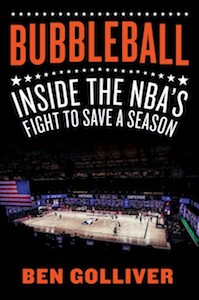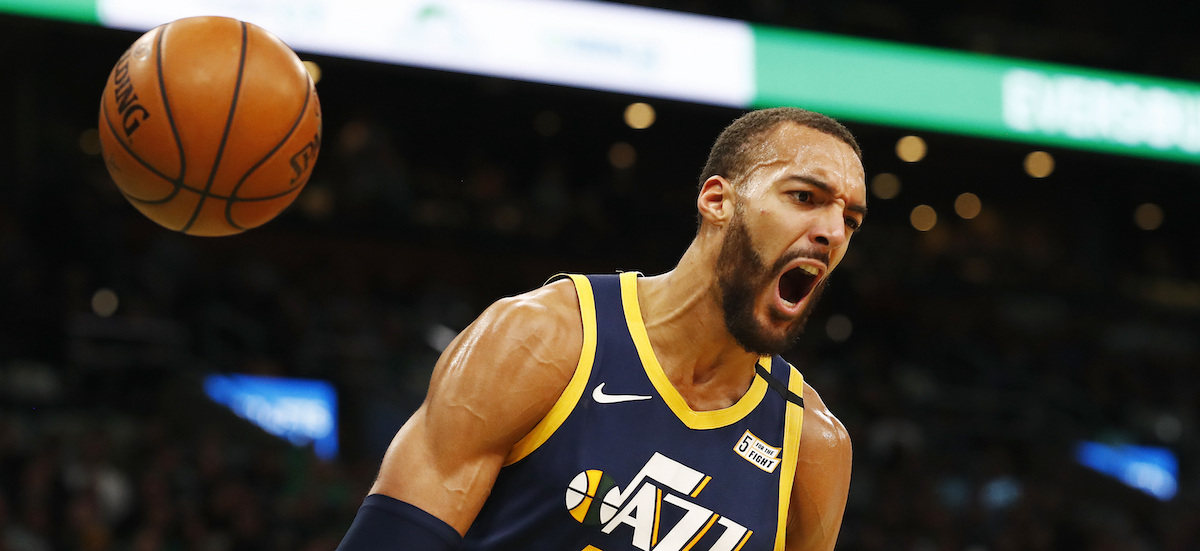No one would have blamed Rudy Gobert if he had skipped the bubble.
The Utah Jazz center’s positive test had stopped the NBA season in its tracks on March 11, but that was only the beginning of his battle with COVID-19. As Patient Zero in American sports, Gobert became the face of a deadly virus at a time when few people in the country knew much about it. When he tested positive, the NBA had just started instituting limited social distancing measures between players and reporters. Fans were still in the arenas, and masks weren’t yet viewed as a critical prevention step, inside or outside the league.
A few weeks before his positive test, Gobert had played in his first All-Star Game. This was a major milestone, especially for a franchise stalwart who had shed tears publicly when he was snubbed during the 2019 All-Star voting. Together with Donovan Mitchell, Gobert had led the Jazz to a 41–23 record and the West’s No. 4 seed when the NBA shut down. The standings were tight, and Utah had a decent shot to climb to the second seed. While the balanced Jazz were viewed as a second-tier contender because they lacked a top ten player, they had advanced to the second round twice in the previous three seasons.
One day, Gobert was at the apex of a decorated career. The next, he had a serious disease and was a national pariah to boot. The coronavirus threw his ascendant life off course.
When I caught up with Gobert for a lengthy interview in late July, he still hadn’t fully recovered his sense of smell after his COVID-19 battle. He also hadn’t been able to see his mother, Corrine, who was stuck in France because of international travel restrictions. Gobert was still smarting from his four-month marathon in the spotlight too.
“The media portrayed it like I caused the NBA to shut down, instead of saying that it’s a pandemic and Rudy Gobert tested positive,” he said. “For a lot of people who don’t think further than what’s put in their faces, they really thought I brought the coronavirus to the United States.”
Gobert made a regrettable mistake a few days before his positive test, a decision that came back to haunt him. As he finished a media interview, he stood up from his chair and reached out to touch the phones and microphones that were laid out on the table in front of him. His action was intended as a lighthearted jab at the NBA’s new coronavirus rule, which required that he be interviewed in a press conference setting rather than a tight locker room space. The devices were on the table to ensure that there was physical distance between reporters and players.
Video of the incident went viral following his positive test, leading many to view him with scorn rather than sympathy. As Gobert’s cold-like symptoms worsened and he experienced tingling toes and sensory loss, he heard from countless social media users who thought he had been reckless and blamed him for ending the season.
Gobert was the one caught on tape acting childishly, but the entire country was caught off guard by the pandemic.“I looked like someone who doesn’t care about other people’s safety or lives,” Gobert acknowledged. “It was hard for me to see so many people question my character based on one video. That was a big learning experience. I know who I am. People around me know who I am. Everyone is going to have a different perception and opinion of you. If I start putting my energy into that, I’m going to be living a very painful life.”
Gobert did what he could to reclaim his reputation, issuing an extensive apology, taping a public service announcement for the NBA, and donating $500,000 to coronavirus relief efforts. He spread the money around to his home country of France, Utah, and Oklahoma, where he had tested positive.
Ranting strangers online were one thing, but Gobert’s fractured relationship with Mitchell, his most important teammate, was another. After the 23-year-old Mitchell tested positive in Oklahoma City, he initially severed contact with Gobert and went on Good Morning America to air his frustrations. Teammates argue all the time over playing time, shots, card games, and even romantic interests, but a coronavirus split was uncharted territory. From afar, I wondered in a column whether the Jazz would be able to repair this relationship or if they would need to trade Gobert or Mitchell. As cold as that sounded, the root of their tension was deeply personal.
Some time passed, and cooler heads slowly prevailed. There was no way to determine whether Gobert had infected Mitchell, whether Mitchell had infected Gobert, or whether someone else had infected both of them. Gobert was the one caught on tape acting childishly, but the entire country was caught off guard by the pandemic. Remember, I had been on a crowded flight from Minneapolis to Los Angeles one day before Gobert tested positive. Not many people had standing to throw rocks in this glass house.
Gobert was in a tough spot during those first few weeks: sick, isolated from society, at odds with Mitchell, on the receiving end of national criticism, and cut off from his mother. “The toughest part was that I was away from my mom,” Gobert said. “I didn’t want her to come over, because I didn’t know if I was still contagious or not. I still haven’t seen my mother since everything happened. It’s something I don’t really like to talk about, but she’s supported me a lot since I was very young. Just knowing how worried she was and knowing she wasn’t able to be with me, it was pretty tough mentally.”
I had expected candor from Gobert but not like this. Rarely do All-Stars directly acknowledge their faults in public.I could relate. I was a mama’s boy who hadn’t seen my mother since February. Gobert and his mother were in the middle of the longest separation of their lives; I hadn’t been apart from my mother for this long since college. Our cases were hardly unique, as the coronavirus was breaking family bonds across the globe.
Gobert danced around another question: Had he been depressed? He told me that it was “hard to be vulnerable,” adding that he was impressed by players like Kevin Love and DeMar DeRozan who had gone public with their mental health stories. Still, Gobert was struggling in April when the NBA first started discussing a summer comeback.
“I was still not in the right state of mind to play basketball,” he said. “I didn’t think it could happen at that point. As things went by, we had meetings and learned more about the virus, I started feeling better mentally and physically. The main concern for most of us was to make sure they weren’t just putting us out there to play and generate money and not care about our health.”
His path back to the court included some key checkpoints. Most of his symptoms subsided, he and Mitchell had heart-to-hearts “like men” and put aside their differences, and he took a long look in the mirror. While Gobert had been Utah’s best player for years, Mitchell was rising fast and the roster around them had matured. Gobert concluded that he was “too honest” with his teammates sometimes, and that he might have come off as overly negative when demanding the basketball or organizing the defense.
For the Jazz to move forward together, he needed to strike a balance between telling his teammates “things you don’t want to hear” and “putting myself in other people’s shoes.” This new approach was reflected in his plans to wear the word “Equality” on the back of his jersey during the bubble.
I had expected candor from Gobert but not like this. Rarely do All-Stars directly acknowledge their faults in public. Understandably, he seemed to be searching for a clean slate and was intent on preaching a positive message heading into the restart. Gobert said that he was now in a “great place” mentally and that his life had felt “kind of empty” during the hiatus. He wanted to prove that he, Mitchell, and the Jazz would survive their trial.
“People were seeing this as something that could destroy the group,” Gobert said. “I see it as something that could make the group even stronger. If you’re able to come back from that, we won’t be worried about a team beating us or a bad defensive quarter. It gives perspective.” To no one’s surprise, the NBA scheduled Zion Williamson, the television ratings magnet, and his New Orleans Pelicans in the opening game of the bubble. But the other half of the matchup raised eyebrows:
Gobert’s Jazz.
Utah had been a model small-market franchise for more than three decades of ownership by the Miller family, but they were rarely given premier television placement. Indeed, the Jazz had appeared on Christmas Day just once since 1998. Their headlining placement here seemed to be orchestrated. Utah had been at the epicenter of the March 11 shutdown, and it would be at the epicenter of the July 30 comeback.
If the NBA bosses wanted a full-circle moment, they got it. Gobert won the opening tip. He scored the bubble’s first points just 18 seconds into the game. He scored 14 points, grabbed 12 rebounds, and blocked three shots in 33minutes. To top it off, he stepped to the free-throw line with six seconds left and the score tied at 104.
If the NBA bosses wanted a full-circle moment, they got it. Gobert won the opening tip.Like many centers, Gobert was an unreliable free-throw shooter, making fewer than half of his attempts as a rookie and hitting just 63 percent for his career. After four months of sickness, anguish, and recovery, he stepped to the line and hit both to deliver a 104–102 win. One game into the Disney World experiment, and I had already witnessed a movie script that felt too good to be true.
What stuck with me most about my time with Gobert was his high level of personal accountability. He was wounded by critical words, he endured difficult personal circumstances, and his structured life was upended at a moment’s notice. Gobert had so many easy paths available to him: He could have made excuses, blamed others, gone into hiding, skipped out on the bubble, demanded a trade, resented everyone, or refused to discuss any of this stuff publicly.
Gobert didn’t need the bubble for his career: He was plenty wealthy, in his prime, and under contract through 2021. But I came away thinking that he needed the bubble to move on with his life. He was back on the court together with Mitchell. He did his best to control his moments of anger and lead positively and inclusively. He tried to show anyone who was watching and tell anyone who was listening that he was a person, not Patient Zero or Public Enemy No. 1.
“We all have the tendency to judge people without knowing them,” Gobert said. “You watch us play basketball every day, but you don’t know who we are, what we’ve been through, what we’re going through. Get to know people. Go deeper. You can spread a lot of positive messages, but you can also spread hate and judgment. You’ve got a choice.”
When players make mistakes during games, coaches often stress “Next play” so that they move on quickly and don’t dwell in the moment. There’s plenty of time for a deeper review and corrective advice during film sessions the following day. To me, it felt like Gobert had put himself through an all-encompassing film session after his infamous viral video. Who did he want to be? How did he want to communicate? How could he make things right? How could he heal?
My lasting image of Gobert was the first thing that I saw when I entered the Jazz’s practice gym for the interview. As his teammates cleared the court, Gobert was doubled over a chair quietly eating a rice bowl. After he was done, he grabbed a Clorox wipe and painstakingly cleaned his makeshift table. He wiped side to side. Front to back. His hand moved like a riding lawnmower through a field of grass.
This man had learned his lesson.
__________________________________

Excerpted from Bubbleball: Inside the NBA’s Fight to Save a Season. Used with the permission of the publisher, Abrams Press, an imprint of ABRAMS. Copyright © 2021 by Ben Golliver.



